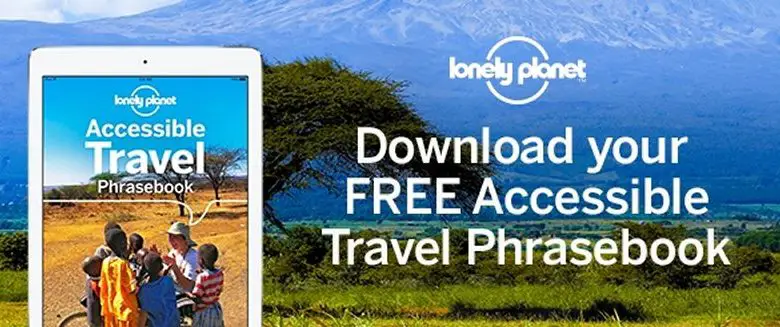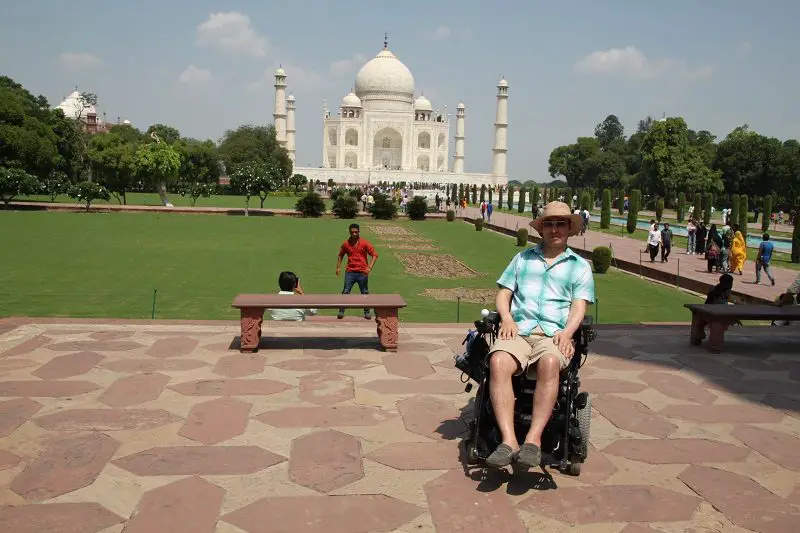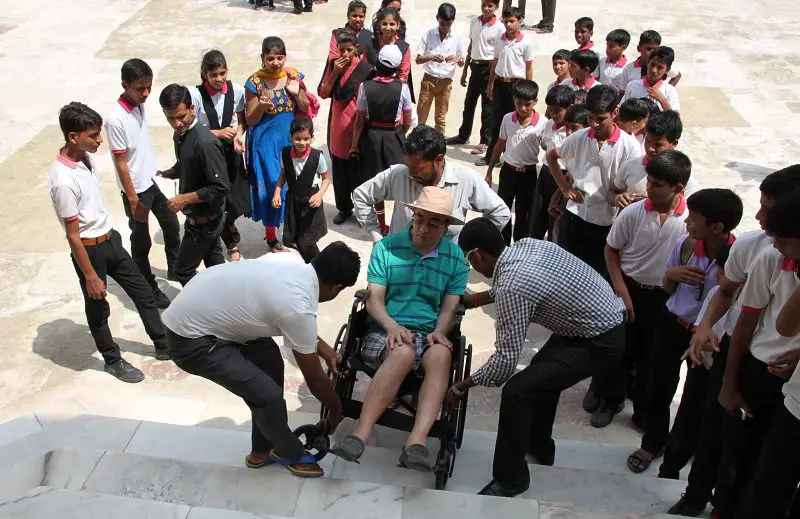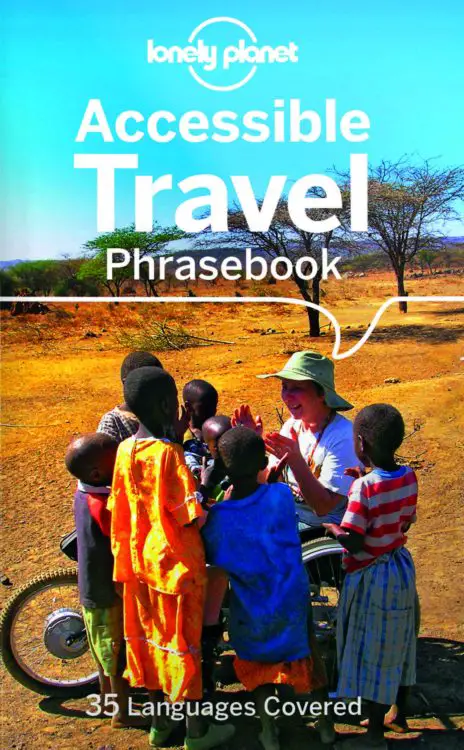
Explore the world with Lonely Planet’s Accessible Travel Phrasebook
Part of what makes travelling with a disability tricky is trying to convey your needs to a total stranger, in another country and often a different language. That’s why Lonely Planet’s Martin Heng, a disabled traveller himself, has created an accessible phrasebook of disability-related terms – and it’s completely FREE to download.
Disabled people travel – it’s a fact. And it’s not really surprising considering we’re just the same as everyone else – the same hopes, fears and aspirations. Well, perhaps a few more fears.
Don’t let anyone try to tell you that it’s a niche market. The World Health Organisation estimates that 1bn people, which is 16% of the world’s population, have a disability. What’s more is that this number is expected to grow, reaching 1.2bn by 2020 and doubling by 2050.
16% of the world’s population has a disability
This hard data proves the value of the so-called ‘purple pound’, so it’s evident that the tourism industry is worth a lot. A Visit England study put the value at £12.4 billion per annum in the UK. For the US, a report by Open Doors put it at $34.6 billion.
An Amadeus White Paper says it’s $70 billion for the US and EU combined, and a recent Australian report estimated its domestic spend at almost $8 billion.


Remember, this is in spite of the many barriers we still face:
- a lower than average disposable income;
- patchy access to public transport;
- insufficient wheelchair-accessible taxis and hire cars;
- heritage tourist attractions that can’t be modified;
- a lack of suitable accommodation;
- poorly-trained service staff who don’t understand our needs and are unaware of how their establishment may or may not cater to them;
- difficulty finding accurate information.
The list goes on… And this is in so-called developed countries! So, to benefit disabled people and the tourism industry, which in turn boosts a country’s overall economy, we disabled people need valuable resources that will make travelling easier.
At Lonely Planet, we have one core belief – that travel is a force for good if practised responsibly. Our Travel for All initiative, which launched in 2014, marks a commitment to promoting access to travel for everyone, no matter what their capabilities or limitations.
We want to help people with access issues get out into the world and experience the benefits that travel has to offer. Our accessible phrasebook is the next step in our bid to make travel accessible for everyone…
Opening up the world for disabled people to travel
All travellers will get more out of their trip by being able to speak a few words of the local language. But, for people with a disability, it’s vital to be able to explain your particular needs.
Since standard phrasebooks are unlikely to contain the language you need to talk about needs around disability, we decided to gather together some disability-specific words and phrases and translate them into as many different languages as we practically could. There are still plenty of barriers to travel for people with a disability – language doesn’t have to be yet another.


It all started back in 2015, when having this conversation with Josh Grisdale, who runs Accessible Japan. He asked me whether there was such a thing as a phrasebook with disability-related terms, something that could help disabled people communicate their needs to others when travelling.
“No”, I replied. “But I’ve been thinking about it.” Well, Josh didn’t just think about it – within a week he had put together a very creditable list of phrases on his website. I was impressed, and asked whether I could use his list as the basis for my project.
With further help from Pieter Ghijsels from Visit Flanders – whose accessibility landing page is something every travel organisation should aspire to – I built up a list of some 100 words and phrases that we thought would assist a traveller with access needs.
Then the real work began. First, I tapped into my networks and posted on accessible travel forums to find as many volunteers as I could to translate these phrases into their native tongues.
I managed to source a group of people to translate these phrases into 35 languages! It’s been a testament to the generosity of those working in accessible travel – something that has never ceased to amaze me since I started on this journey five years ago.
But as any publishing professional will tell you, one pair of eyes is never enough. So I had to try to find a second person to proofread each language, which in most cases I managed to do…eventually.
The fun didn’t stop there. I had a great editor, who took my content and worked tirelessly to pull out essential information from our existing Lonely Planet phrasebook, so they could be combined into the new accessible version.
It wasn’t an easy task. In many cases, information hadn’t been updated for years, although, thankfully, language doesn’t change at the same rate of places we review in our guidebooks. But finally, after the years of research and refining, we have our Accessible Travel Phrasebook.
Accessible Travel Phrasebook


Our 386-page Accessible Travel Phrasebook includes and covers:
- 35 languages, from Arabic to Vietnamese;
- around 100 disability-specific words and phrases;
- easy-to-use pronunciation guides;
- a glossary of common conditions;
- vocabulary relating to hotels and transportation;
- equipment you might need;
- how to explain about your allergies;
- getting help;
- basic words and phrases.
Plus, it’s all completely FREE to download – Accessible Travel Phrasebook.
If it encourages just a few more people with a disability to get on the road, we will have taken one more step towards making the benefits of travel accessible to all.
It should be seen as a companion resource to Lonely Planet’s Accessible Travel Online Resources, which contains hundreds of useful web links and is completely free to download.
I’d like to take this opportunity to thank the dozens of contributors that worked with me on this book. Many of them work in the accessible travel sector and gave their time freely and generously.
By Martin Heng
More on Disability Horizons…
- Top 5 accessible cities for wheelchair users
- Assistive apps to help you get around London
- Top 10 accessible attractions in Lisbon
Do you know of any great travel resources for disabled people? Share them with everyone else by leaving your comments below, messaging us on Facebook or tweeting us @DHorizons.
I love that you have mentioned “heritage tourist attractions that can’t be modified.”
It reminds me of real estate tags of buildings, which including both residential and places of public amusement (theatres, restaurant, shopping, etc.), that are likewise politely politely referred to as “grandfathered” (built before the ADA’s established set of guidelines).
People can “call” them by any moniker or modifier they like, but the fact is they are allowed to remain INACCESSIBLE.
If certain restaurants were known to not allow Asians, or specific subway and bus stops were unavailable for use to black people, or a number of theatres did not allow entrance to Hispanics, there would be PUBLIC OUTRAGE; and yet, as a society, it has been tolerated for the aforementioned places to remain closed off to almost 1/5 of its population. A population that actually includes people of all races and ethnicities, who may or may not practice different religions, are of all ages, various married statuses, whether honorably or dishonorably discharged from the military, and may have or do not have children.
Sounds like discrimination to me.
#UnequalIsNotEqual